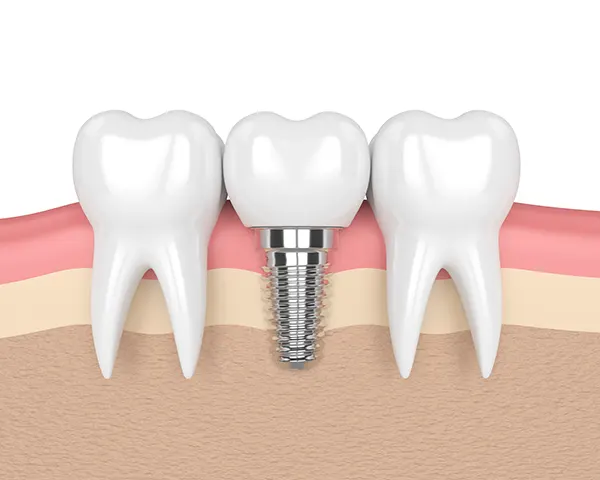How Long Do Dental Implants Last?
Posted on 4/1/2023 by Office at Capitol Square Dental |
 Research shows that close to 200 million people are living without one or more natural teeth. If you are one of them, you understand the struggle. However, the good news is that you do not have to live with missing teeth. You have options for tooth replacement. Research shows that close to 200 million people are living without one or more natural teeth. If you are one of them, you understand the struggle. However, the good news is that you do not have to live with missing teeth. You have options for tooth replacement.
For many years, dentures and bridges were the only options for tooth replacement. These could be bulky and uncomfortable. However, as research advanced, dental implants became available. Ultimately, dental implants became the gold standard because they look, feel, and function more like natural teeth.
In this article, we’ll explain more about what you need to know about dental implants at Capitol Square Dental.
WHAT ARE DENTAL IMPLANTS?
Dental implants are a tooth restoration option made up of three pieces. The first piece is the implant screw, which is placed in the jawbone to act as an artificial tooth root. It creates a stable base for the restoration.
The abutment is the piece that secures the restoration to the implant screw. It can hold the restoration in place permanently or can allow the restoration to be removed as needed.
Finally, the restoration replaces the visible portion of the tooth. A restoration can be a single tooth, or crown, or can be a full dental prosthesis.
PROCESS FOR GETTING DENTAL IMPLANTS
Before you consider getting dental implants, it’s important to understand that this is an extensive and intensive process. You will need to be willing to invest several months to a year or more from start to finish.
CONSULTATION
The first step in any procedure at Capitol Square Dental is to schedule a consultation appointment. During this visit, our dentist will perform a comprehensive exam, which will include x-rays and other appropriate imaging. We will also discuss your oral and medical history as well as your current conditions and your personal expectations for treatment.
This information will be used to determine if you are a candidate for dental implants. If we believe that you are and, if you want to proceed, we will schedule any preliminary procedures needed.
PREPARING YOUR MOUTH FOR IMPLANTS
Patients who are already missing teeth and are in good oral and overall health can have implants placed right away. However, this isn’t always the case. First of all, dental implants require that the tooth be missing. If any part of the tooth is still present, it will need to be extracted before the implant can be placed. In many cases, an implant can be placed at the same time as the extraction.
In addition, dental implants require adequate jawbone density and health for support. If you have any jawbone loss, you may need bone grafting. This usually requires a healing period before the implants can be placed.
If you have active gum disease, implants cannot be placed.
IMPLANT PLACEMENT
Once your mouth is ready, implants can be placed. We begin this process by making an incision in the gum and drilling a hole in the jawbone. The implant screw is placed in the hole and the incision will be stitched close. For patients who are missing all of their teeth, a temporary overdenture may be used so that you are not completely without teeth.
HEALING
Healing usually takes several months. For the first few days, it’s best to stick with a liquid diet. You can slowly transition into a soft food diet. You’ll need to stick with soft foods for several weeks. If you bite down or chew on something tough or hard, you may damage the implants and cause them to fail.
ABUTMENT PLACEMENT
After you have healed from the initial surgery, the incision will be reopened, and an abutment will be placed on the implant screw. This is the piece that will secure the restoration to the implant screw. A healing cap will be placed, and we will order your prosthesis. You can choose the type and color that you prefer.
RESTORATION PLACEMENT
Typically, it takes about 2 to 3 weeks for the lab to fabricate the restoration. Once we receive it, the healing cap will be removed, and the restoration will be fitted to the abutment. You will finally have your full set of replacement teeth.
WHAT ARE THE BENEFITS OF DENTAL IMPLANTS?
Dental implants offer several benefits, including:
| • |
Durability
|
| • |
Dental implants are designed to last a lifetime with proper care and maintenance.
|
| • |
Protects jawbone density and health
|
| • |
Your jawbone depends on tooth roots to keep it healthy and dense. The implant screw replaces the stimulation lost when teeth are missing.
|
| • |
Looks and feels natural
|
| • |
Dentures and bridges often look artificial. However, dental implants look and feel more like natural teeth.
|
| • |
Stabilizes neighboring teeth
|
| • |
When you are missing a tooth, the jawbone begins to deteriorate, which can create instability for neighboring teeth. However, a dental implant supports these teeth.
|
| • |
Restores appearance and confidence
|
| • |
Missing teeth can cause facial sagging, which can make you appear much older. Dental implants fill in those spaces, supporting your facial muscles and making you appear younger.
|
| • |
Restores bite force
|
| • |
Restorations such as dentures sit on top of the gums, only providing about 10% of your natural bite force. Since implants are placed in the jawbone, they restore your natural bite force.
|
| • |
Improves quality of life
|
| • |
Thanks to the above benefits and others not mentioned here, dental implants improve your overall quality of life. |
HOW LONG DO DENTAL IMPLANTS LAST?
While the visible portion of the restoration may require replacement within about 20 years, the implant screw should last a lifetime. However, there are several factors that can have an impact on the life expectancy of your implants.
FACTORS THAT AFFECT LONGEVITY
The following factors have an impact on the life expectancy of dental implants:
| • |
Care and maintenance habits
|
| • |
Experience and expertise of the dentist performing the procedure
|
| • |
Jawbone density and health
|
| • |
Medical conditions, medications, and medical treatments
|
| • |
Age
|
| • |
Lifestyle habits such as smoking or using teeth as tools
|
| • |
Tooth clenching and grinding |
HOW TO CARE FOR DENTAL IMPLANTS
One of the biggest advantages of dental implants is the fact that there are no special care considerations. You can simply brush and floss them as you would your natural teeth. You do not have to remove them to clean or soak them. Also, you do not have to use any special cleanser- a non-abrasive toothpaste works fine.
DO YOU NEED DENTAL IMPLANTS? SCHEDULE YOUR CONSULTATION WITH Capitol Square Dental TODAY
If you are missing one or more teeth, schedule your Consultation with Capitol Square Dental in Columbus. Our highly trained dental professionals work with patients of all ages providing general, cosmetic, and restorative procedures. We offer sedation for patients who have anxiety when visiting the dentist, as well as for those who are unable to sit still for any length of time while we work.
We are located on South High Street in Columbus. Our office hours are Tuesday and Thursday from 8:30 AM to 6:00 PM. We are available at any time of the day or night for dental emergencies. Let us take care of all of your dental needs.
DENTAL IMPLANTS FAQS
The team at Capitol Square Dental is committed to ensuring that patients are 100% aware of their condition and the appropriate treatments. We will take the time to discuss any questions or concerns you may have. Below are a few of the questions that we get most often from our patients.
ARE DENTAL IMPLANTS PERMANENT?
Yes, dental implants are designed to be permanent and last a lifetime with proper care and maintenance.
WHAT IS THE DIFFERENCE BETWEEN A DENTAL IMPLANT AND A BRIDGE?
A dental implant is a tooth replacement option for patients missing one or more teeth. An implant may support a single tooth replacement or can be used with multiple implants to replace up to an entire arch.
A dental bridge is designed to replace several missing teeth in a row. A traditional dental bridge uses the natural teeth on either side of the gap for support. In some cases, it may be appropriate to place dental implants on either side of the gap for support.
HOW LONG IS RECOVERY AFTER GETTING DENTAL IMPLANTS?
Typically, recovery from dental implant placement takes several months to a year or more depending on how your body heals. Certain medical conditions, such as diabetes or heart disease, and lifestyle habits, such as smoking can slow down the healing process.
HOW MUCH DO DENTAL IMPLANTS COST?
On average, dental implants cost $5,000 per tooth. You may pay up to $60,000 or more for a full-mouth restoration. Due to this, many patients opt for hybrid options such as the All-on-4 system, which uses 4 dental implants to replace a full arch. On average, this option costs around $12,000 per arch, or $25,000 for both.
WHY NO DAIRY AFTER DENTAL IMPLANT?
Research has shown that, while dairy does provide many vitamins and minerals to support a healthy body, these products may also cause inflammation of the soft tissues of the mouth. This can significantly slow down healing time. In addition, these products are known to trigger nausea and vomiting in some patients. This introduces stomach acid into the mouth and the surgical sites, which can cause inflammation and infection, which may lead to complications and implant failure. |
|
